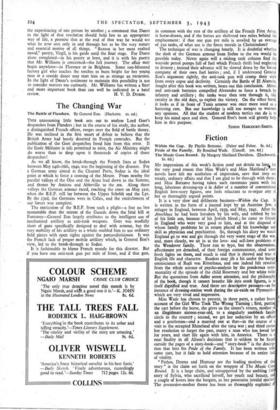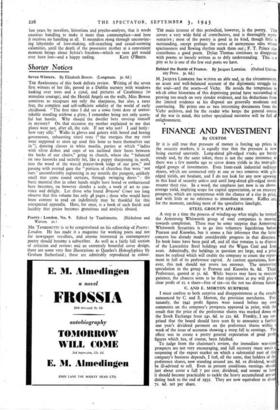Fiction
The Music Goes Round. By Margery Maitland Davidson. (Duckworth. 8s. 6d.) MY impressions of this week's fiction need not detain us long, for the very good reason that Miss Wade's and Miss Maitland's'new novels have left me scatheless of impression, save that they are steady, ordinary affairs and that I am glad to be through with them; and Miss Bottome having taken such enormous pains with her long, laborious dressing-up a la Adler of a number of conventional English love-story figures, one feels reluctant to re-argue any of her so thoroughly argued points.
It is a very slow and deliberate business—Within the Cup. It is written in the form of a journal kept by an Austrian Jew, a refugee in England, between April, 1939, and May, 1941. After the Anschluss he had been forsaken by his wife, and robbed by her of his little son, because of his Jewish blood ;. he came to friends in England who were very good to him, and at the disposal of whose family problems he in return placed all his knowledge and skill as .physician and psychiatrist. So, through his diary we watch England go to war and get through the very worst stage of the war, and, more closely, we sit in at the love- and self-love problems of the Wendover family. These run to type, but the observations, affectionate yet detached, of their foreign commentator, shed some fresh lights on them, and much is said that is shrewd and true of English life and character. Readers may jib a bit under the benign omniscience of Rudi von Ritterhaus, and one indeed felt revolted from the whole science of psycho-analysis by the ponderous senti- mentality of the episode of the child Rosemary and her white tulip. But the quotations from Adler arrest attention, and the philosophy of the book, though it cannot breathe life into stock figures, is in itself dignified and true. And there are descriptive passages—as for instance of dressing-station work during the air-raids on Plymouth— which are very vivid and impressive.
Miss Wade has chosen to present, in three parts, a rather heavy account of the Girl Who Took The Wrong Turning ; first, putting the cart before the horse, she gives us the sinner's return, mother of an illegitimate sixteen-year-old, to a singularly snobbish family circle in the country • second, we get her seduction by an officer and a gentleman—and a married one at that—in the course of a visit to the occupied Rhineland after the 1914 war ; and third comes her resolution to forget the past, marry a man who has loved her for years, and start life again with him, in America. There is a neat finality in all Alison's decisions that is-seldom to be found outside the pages of a story-book—and " story-book " is the descrip- tion that best fits Pride of the Family. It has been written with some care, but it fails to hold attention because of its entire lack of vitality. " Pathos, Drama and Humour are the leading motives of this story " is the claim set forth on the wrapper of The Music Goer Round. It is a large claim, and unsupported by the ambling little story of Sylvia, who sacrificed herself, her youth and beauty, and a couple of lovers into the bargain, to her possessive invalid mother. The possessive-mother theme has. been so thoroughly exploited of
late years by novelists, historians and psycho-analysts, that it needs cautious handling to make it more than commonplace—and here it receives no handling at all. It meanders along through unconvinc- ing labyrinths of love-making, self-searching and casual-seeming calamities, until the death of the possessive mother at a convenient moment brings about Sylvia's freedom—which no sane girl would
ever have lost—and a happy ending. KATE O'BRIEN.



























 Previous page
Previous page